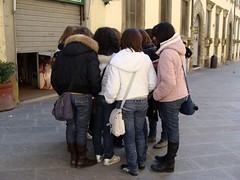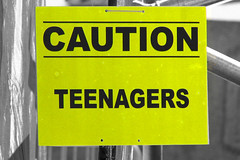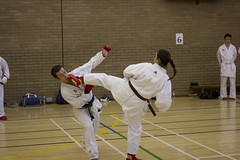 Some
of those questions related to craft. Could I create a convincing voice
for my protagonist, a seventeen-year-old boy who loves sports but
doesn't much care for school? (In fact, his voice seemed to come to me
naturally. Maybe I should be concerned.) Could I avoid outdated slang,
as well as slang so cutting-edge it might fade from fashion by the time
the book made it into print? What about minority characters? I've read a
number of YA novels written by other middle-aged white ladies, and
their attempts to write dialogue for streetwise African-American
teenagers have often made me cringe. Could I have a diverse cast of
characters without making similar blunders?
Some
of those questions related to craft. Could I create a convincing voice
for my protagonist, a seventeen-year-old boy who loves sports but
doesn't much care for school? (In fact, his voice seemed to come to me
naturally. Maybe I should be concerned.) Could I avoid outdated slang,
as well as slang so cutting-edge it might fade from fashion by the time
the book made it into print? What about minority characters? I've read a
number of YA novels written by other middle-aged white ladies, and
their attempts to write dialogue for streetwise African-American
teenagers have often made me cringe. Could I have a diverse cast of
characters without making similar blunders?And then there's the issue of profanity.
For some YA authors, apparently, it's not an issue at all. A couple of years ago, when I went to a YA panel at a mystery conference, one author lamented that some middle-school librarians won't carry her novel because its title contains a certain word--I'd rather not say which one. The other panelists sympathized. It's ridiculous, they said, for librarians and teachers to fuss about this word and that word. After all, kids today are smart. They know what all the words mean. And, as writers, we need to keep it real.
The panelists made some legitimate points. Yes, teenagers today are smart. Yes, they know what all the words mean. The thing is, too many decades ago, when I was a teenager myself, we knew what all the words mean, too. I still remember the first time I heard one of my contemporaries use what I'll refer to as the F-word. I was chatting with a group of friends when Joanne casually dropped the word into the conversation. The rest of us reacted with stunned silence--not because we didn't know what the word meant, but because we did. We just chose not to use it, because we thought it was crude.
That opinion seems to have faded. I don't have any supporting data I can cite, but it seems safe to say that most people today use profanity more freely than most people did thirty or forty years ago. I think that's probably true for people of all ages, not only for teenagers.
 Why
did people change their opinions about which words are too crude to
use? Again, I can't cite supporting data, but I suspect books, movies,
and other media led the way. That's definitely where I first encountered
many of the words that now slip into my speech more easily than they
used to, words spoken by clever and likable characters on the page or
the screen, words I heard so often that they lost their shock value and
began to seem like normal, acceptable things said by perfectly nice
people. So when we say the language in YA novels should keep it real,
perhaps we should remember that books probably don't just passively
reflect reality. Probably, they also help shape it. If today's teenagers
use more crude language than the teenagers in my day did, it's probably
partly because of the movies they see, the music they listen to, and
the books they read. And if that's true, maybe YA authors need to think
carefully about the kind of influence they want their books to have.
Why
did people change their opinions about which words are too crude to
use? Again, I can't cite supporting data, but I suspect books, movies,
and other media led the way. That's definitely where I first encountered
many of the words that now slip into my speech more easily than they
used to, words spoken by clever and likable characters on the page or
the screen, words I heard so often that they lost their shock value and
began to seem like normal, acceptable things said by perfectly nice
people. So when we say the language in YA novels should keep it real,
perhaps we should remember that books probably don't just passively
reflect reality. Probably, they also help shape it. If today's teenagers
use more crude language than the teenagers in my day did, it's probably
partly because of the movies they see, the music they listen to, and
the books they read. And if that's true, maybe YA authors need to think
carefully about the kind of influence they want their books to have.Or maybe it's no big deal. After all, we're just talking about words. If today's teenagers use language once considered crude, so what? What's wrong with crude language? I won't try to make a full argument here, but I encourage you to read an essay by Barbara Lawrence, "Four-Letter Words Can Hurt You" (http://talkingtok.wikispaces.com/file/view/4+letter+words.pdf). Lawrence argues that many crude words dehumanize people in general, and women in particular, by reducing them to purely physical terms.
I'll provide an example of a crude phrase that does exactly that, an expression Lawrence doesn't discuss. When did it become all right to say "knocked up"? I've heard several television comedians use that expression recently, and this one still shocks me. Two human beings come together to create a new life, in what should be an affirmation of love and commitment and faith in the future. And these comedians reduce this act to "knocked up"? Now it's a violent act, a victory of the strong over the weak, an assertion of a man's power to impose himself on a woman. I'm sorry. I think I've got a pretty good sense of humor, and I know political correctness can go too far. But I don't think "knocked up" is cute or funny. I think it's ugly. And I think that, as a YA author, I have a responsibility to refrain from doing anything that might encourage young people to think this ugly expression, or any other ugly expression, is okay. I think I have a responsibility to make careful choices, in the hope that any influence I might have will encourage my young readers to make careful choices, too.
 So
what standards should guide an author making choices about what sort of
language to use in a YA mystery? Yes, we want to keep it real. But for
any fiction writer--YA or otherwise, mystery or otherwise--realism isn't
the only relevant consideration. My YA mystery is set in a small town
in Virginia. If I were intent only on making dialogue realistic, my
teenaged characters would say "sir" and "ma'am" whenever they address
adults. I chose not to let them do that.
So
what standards should guide an author making choices about what sort of
language to use in a YA mystery? Yes, we want to keep it real. But for
any fiction writer--YA or otherwise, mystery or otherwise--realism isn't
the only relevant consideration. My YA mystery is set in a small town
in Virginia. If I were intent only on making dialogue realistic, my
teenaged characters would say "sir" and "ma'am" whenever they address
adults. I chose not to let them do that.When I moved from Ohio to Virginia, I was suspicious when my Lynchburg College students kept addressing me as "ma'am"--"Yes, ma'am," "I'll have that essay done tomorrow for sure, ma'am." At first, I thought they were being sarcastic, implying I was as dictatorial as a drill sergeant--in Cleveland, almost nobody outside the military says "ma'am." Eventually, I realized that these students say "ma'am" because they were raised to say it, that they were being respectful, not sarcastic.I was stunned. I was used to student sarcasm and knew how to handle it, but respect left me blinking in confusion. And when I wrote Fighting Chance, I decided to keep "sir" and "ma'am" to a minimum. I felt that, realistic as these expressions might be in a novel set in Virginia, they might not feel realistic to readers in other parts of the country.
That's the sort of decision fiction writers make about language. After all, if we were aiming only for realism, all the dialogue we write would be studded with "um" and "er" much more often, and our characters would constantly be saying "like" and "you know."" Unless we're trying to create some sort of comic effect, we usually edit such stumbles from the dialogue we write, along with the repetitions and qualifiers that make most real speech far from vivid and entertaining.
I'm reminded of a famous statement from William Wordsworth's "Preface" to the second edition of Lyrical Ballads. (Yes, I know. If you hear reports of earthquakes in Grasmere today, they're undoubtedly caused by Wordsworth spinning in his grave because he never intended his words to be used in this context.) Wordsworth says the language of poetry should be "as far as is possible, a selection of the language really used by men" [and women], and "that this selection, wherever it is made with true taste and feeling, will of itself form a distinction far greater than would at first be imagined, and will entirely separate the composition from the vulgarity and meanness of ordinary life."
How about that as a standard for the language in YA mysteries? We won't make our characters say "golly" and "darn," because that's not language really used by teenagers--not today, and not often even in my day. But we can select some of the language really used by teenagers, and not select other language really used by teenagers, because we don't want to encourage our young readers to think "vulgarity and meanness" are okay. We don't want to use whatever influence we might have to make real-life teenaged speech any meaner and more vulgar than it already is.
 Naturally,
I can't resist the temptation to use a passage from my YA mystery to
show how this standard can be applied. In the first chapter of Fighting Chance,
my protagonist, seventeen-year-old Matt Foley, is at a tae kwon do
tournament, sitting on the home team bench as he and his friends watch
their coach spar with a mysterious baby-faced stranger named Bobby
Davis. Near the end of the first two-minute period, the coach scores a
point by using a combination move he's been teaching his students. It's a
short-lived victory--a few pages later, Davis kills the coach with a
powerful kick to the larynx, and Matt and his friends will spend the
rest of the book proving it was murder, not an accident. For now, Matt's
impressed not only by his coach's skill but also by his restraint:
Naturally,
I can't resist the temptation to use a passage from my YA mystery to
show how this standard can be applied. In the first chapter of Fighting Chance,
my protagonist, seventeen-year-old Matt Foley, is at a tae kwon do
tournament, sitting on the home team bench as he and his friends watch
their coach spar with a mysterious baby-faced stranger named Bobby
Davis. Near the end of the first two-minute period, the coach scores a
point by using a combination move he's been teaching his students. It's a
short-lived victory--a few pages later, Davis kills the coach with a
powerful kick to the larynx, and Matt and his friends will spend the
rest of the book proving it was murder, not an accident. For now, Matt's
impressed not only by his coach's skill but also by his restraint:First, a few words about Joseph. I'll admit I shied away from the challenge of writing dialogue for a streetwise African-American teenager. I didn't think I could do a convincing job. I did want a diverse cast of characters, though, so I did the best I could. Joseph was born in Africa, and he's now an American. The way he speaks is based on the speech patterns of a number of international students I've had over the years--bright, ambitious students who study the dictionary every night to expand their vocabularies but sometimes have problems with idioms and syntax. I hope Joseph's dialogue sounds real and also subtly encourages young readers to respect the speech of newcomers still in the process of learning English.It was pretty cool--like Coach had been holding back, passing up chances for easy points, waiting to score with that particular combination so he could show us how effective it is. Now, that's a teacher, I thought. "Great combination, Coach," I called.Joseph seemed to be having the same thoughts I was. "Most instructive," he said. "Mr. Colson said we should try to score such way--roundhouse kick, right jab, left punch. Now he has performed one, to demonstrate us how to aspire."Derrick drew his head back. "To demonstrate us how to aspire? What's that--Latin? What the hell are you saying?""You know exactly what he's saying," I said. "Don't be a jerk, Derrick." Joseph's from Kenya. His family left five or six years ago, after his father got killed, and moved around until the Episcopal Church found his mother a job in Ridgecrest. In some ways, Joseph's English is probably better than mine. It's definitely better than Derrick's. He's got a formal way of putting things, though, and sometimes his vocabulary's off--natural enough, I guess, if you learn English in a classroom instead of at home. There's no point making a big deal whenever something comes out strange.
As for Derrick, he's a minor character--not a bad guy, really, not at heart, but he thinks too highly of himself and sometimes tends to be a bully. He says "what the hell," not "what the heck," because I can't remember the last time I heard anyone, of any age, say "what the heck." But I often hear teenagers, and others, say "what the hell." I've also heard them say harsher things, but I don't think it's necessary to use anything harsher here. "What the hell" is, to modify Wordsworth's phrase, a selection of the language really used by teenagers. I think it works here.
In response to Derrck, Matt says, "Don't be a jerk, Derrick." (For those familiar with Blake Snyder's Save the Cat, this is Matt's save-the-cat moment, the moment when he proves he's worthy of our respect by standing up to a would-be bully.) He could have said something harsher than "jerk"--we can all think of harsher words he could have used. Lots of teenagers use those words, but lots use "jerk," too. Maybe Fighting Chance would seem edgier and more daring if Matt had used one of those other words. But I think "don't be a jerk" is a legitimate selection of the language really used by teenagers, and I'm willing to live with the consequences of making that selection.
I'm not saying that I've found the ideal solution, only that I think the issue is important. I don't think YA authors should shrug it off with cliches about keeping it real. We make careful, responsible decisions about the way we portray various groups, and the way we present various issues, because we think our books might influence the way young people think and act. If our books might also influence the way they speak and write, shouldn't we make careful, responsible decisions about language, too?

Hi, Bonnie,
ReplyDeleteSince I've written several YA novels myself, this topic is of great interest to me. Like you, I've taught teens both at the high school and college level and raised my own teenagers. So I know very well how they talk and what they think. The last two YA novels I wrote published by Clean Reads Press, STACY'S SONG and THE DEVIL AND DANNA WEBSTER, offered a bit of a challenge language wise. I want to be true to the way teens behave and talk, but the publisher demanded certain censorship.
Thanks for your comment, Jacquie. Unreasonable censorship is certainly frustrating. I'm sure that, as a teacher, you've seen, as I have, that there's tremendous variety in the way young people speak. My students in Cleveland didn't sound much like my students in small-town Virginia, and even within a single classroom, there are students who use a lot of profanity and students who use none. The diversity adds to the challenges--and the fascination--of both teaching and writing.
ReplyDeleteAs you indirectly suggest, much of the problem of today’s kids swearing can be blamed on us adults. We see bumper stickers with raw language, decals for truck windows showing a cartoon kid peeing, tattoos with graphic vulgarity, preachers who think it’s ƒ-ing cool to swear, and a couple of days ago I saw a T-shirt that read ‘Pandas are a__holes’. (So is the guy wearing it, I thought. Charming.)
ReplyDeleteIf you try to keep swearing out of the home, you hear phrases that came from their coach or bus driver. Not long ago I read an argument that’s a twist on Barbara Lawrence’s article, that swearing is a feminist prerogative because men controlled women’s language for too long.
(Slightly off topic, but that reminds me of a conversation long, long ago between two women. One said, “You let him ƒ you?” And the other replied, “No, I ƒ-ed him. It makes a difference, you know.”)
Referring to Lawrence’s article, I’ve always found ‘piece’ (of tail) highly offensive, but why don’t I think ‘hunk’ is? Why does my stomach turn when I see a guy leer at a girl but not the other way around? I don’t have an answer.
Your article makes excellent points and I’m a believer in controlled use of language, even bad language. Far too often people substitute words to shock rather than think, and that’s not good.
Thanks for your comment, Leigh. I agree that people sometimes use crude language for shock value. I'll admit I felt that temptation--would young readers be impressed by how daring and edgy I am if I used naughty words? But I think it's a temptation that should be resisted. I'm intrigued by your comment about "hunk" and "piece." Maybe the difference is that "hunk" (like "stud")implies admiration--it implies the man is attractive, virile, and powerful. "Piece" doesn't imply any of that. I tried to think of a slang term for a woman that focuses on sexuality but also implies other positive qualities. I couldn't come up with one.
ReplyDeleteVery interesting post. As a reader, I don't think I've ever missed seeing a vulgar word where one might have been used. However, sometimes a vulgar word in a story will make me pause, not in a good way to admire the writer's talent, but rather in puzzlement at best, and annoyance at worst. So, as I often do, I make such decisions about things like word choice by asking myself, how will readers react to this? If in doubt, I usually leave it out. Because, yes, many, many words are derogatory to women. Why, for example, is there even a vulgar word for making love? Why do we accept that, and even worse, as women, sometimes use it ourselves?
ReplyDeleteThanks for your comment, Jan. I think you're right--vulgar words tend to call attention to themselves, and that's distracting. As you say, we don't miss vulgar words if the author uses a milder expression. We just stay focused on the characters and the story--isn't that what we want readers to focus on? And I agree it's too bad when women writers use vulgar words derogatory to women, and also when they use vulgar words derogatory to men. If we're offended when men use terms that reduce women to sexual objects, let's not prove how liberated we are by using terms that reduce men to sexual objects.
ReplyDeleteI like your last comment. I'm a teacher, not a writer, and dealing with obscenity is a battle. It's ironic since we're forced to focus on politically correctness.
ReplyDeleteMaybe we're too hard on men at times. Beyond a touch of envy, I don't think it's awful if a man says "She's a babe." When we outlaw phrases like that, dare we complain when worse comes along? Of course the answer is a resounding yes, but you understand what I mean.
I confess I use some words and even used them in the throes of passion, but I try to use them measuredly and I certainly wouldn't write them in books! Just sayin'.
I don't always control my fictional language as tightly as you do, but I also don't write for young adults. Except in my cozies, of course, where there's very little "language."
ReplyDeleteI'll share a story about our son that you may be able to use. We had moved from MN to TX while he was in junior high, then made another quick move to MI. I guess the "ma'am" stuff was drilled into him in TX, because he called his teacher "ma'am" when he got to MI. He got sent to the principal's office for being a smart aleck. Sometimes he WAS a smart aleck, but I think that time he probably used the word unconsciously and it got the poor kid into trouble.
Thanks for your comment, Anonymous. I don't mind "babe," either--I'd been trying to think of a female equivalent of "hunk" or "stud," and "babe" may be it. Unlike "piece" and some other terms used to refer to women, "babe" doesn't reduce a woman to less than a person. And I sometimes find myself using crude language, too, usually when I'm really angry or really frustrated--if I trip over the cat and drop the gravy boat on the floor, I'm not likely to use gentle adjectives to modify either "cat" or "gravy." The thing is, I didn't use these words when I was younger, no matter how upset I was. They simply didn't come to mind. Now they do, because I've heard them so often in movies and cable TV shows, and read them so often in books.
ReplyDeleteKaye, thanks for your comment, too. Your poor son! But I understand how his Michigan teacher felt. When my Virginia students called me "ma'am," at first I was honestly sure they were making fun of me--it took me a while to catch on. And the language I use in writing varies depending on the audience, just as yours does. I usually keep my language pretty tame in stories for AHMM--I'm use theological curse words such as "hell," but not sexual or scatological ones. (When I started writing for AHMM, in the late eighties, the guidelines for writers included cautions about strong language. The last time I checked, those cautions were gone, and I've seen some language in the magazine that I never saw twenty or so years ago.) The language in FIGHTING CHANCE is tamer still because I'm writing for young readers, though I do let my nastier characters use slightly stronger language than my nicer characters do. And in INTERPRETATION OF MURDER, my mystery for adults, I do let my characters (again, usually the nastier ones) use some crude expressions once in a while,when realism seems to demand it.
ReplyDelete